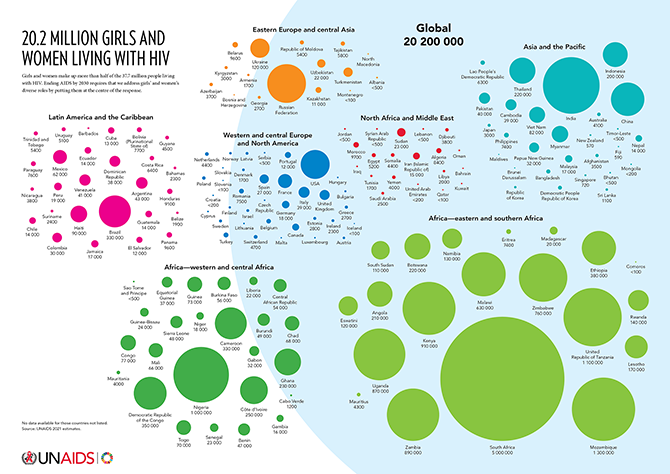8 March 2022
Winnie Byanyima
Executive Director of UNAIDS
Under-Secretary-General of the United Nations
Congratulations on International Women’s Day to all whose determination and solidarity is the light of hope and the power for change.
Women are not waiting to be offered a seat at the table, they are bringing their own fold-up chair.
This year’s theme calls for “Gender equality today for a sustainable tomorrow”. As the women’s movements have brought to the fore, and as all the evidence demonstrates, every development goal depends on ensuring the rights of all women and girls.
Gender inequality is a threat to everyone. We cannot uphold patriarchy and defeat AIDS.
The COVID-19 crisis has exacerbated the intersecting inequalities women face. Surges have been reported in gender-based violence, forced child marriages and teenage pregnancies. Almost one in two women reported that they or a woman they know experienced violence since the COVID-19 pandemic started. Calls to helplines have increased fivefold in some countries during the pandemic. Violence against and harassment of lesbian, gay, bisexual, transgender and intersex people has increased, as has stigma and discrimination against marginalized communities. The trajectory to gender parity, which already had been 100 years away, is now 36 more years away.
The goal cannot only be to get back to normal, however: normal was the problem. Instead, leaders need to seize this moment of crisis and opportunity to secure transformation. They need to deliver now on the bold policy shifts and upscaled investments that will ensure equality.
We must end gender-based violence. Violence violates the dignity and freedom of women. Violence drives the AIDS pandemic. In areas of high HIV burden, women subjected to intimate partner violence face up to a 50% higher chance of acquiring HIV.
We must remove all barriers to access to sexual and reproductive health and rights. Only 55% of women and adolescent girls report being in control of decisions about their own sexual and reproductive health and rights. Maternal mortality is the leading cause of death for adolescent girls aged 15–19 years globally, and HIV is the third leading cause of death among women aged 15–49 years—both preventable when women control their own bodies.
We must ensure that every girl is educated and empowered. Research shows that completion of secondary education can reduce a girl’s risk of acquiring HIV by up to half, and by even more if this is complemented by a package of rights and services. We need all girls, including those who dropped out during the COVID-19 pandemic and those who were out of school even before COVID-19, in school, safe and strong.
As countries struggle with the current fiscal challenges, services vital for gender equality are among sectors that are suffering the biggest budget cuts. If we do not find the money, we will all pay a much higher price as a consequence.
The only effective route map to ending AIDS, achieving the Sustainable Development Goals and ensuring health, rights and shared prosperity, is a feminist route map. Equality is the means of progress and is the right of every woman.
Women, in all your wonderful diversity, we the United Nations are on your side, and by your side.
UNAIDS
The Joint United Nations Programme on HIV/AIDS (UNAIDS) leads and inspires the world to achieve its shared vision of zero new HIV infections, zero discrimination and zero AIDS-related deaths. UNAIDS unites the efforts of 11 UN organizations—UNHCR, UNICEF, WFP, UNDP, UNFPA, UNODC, UN Women, ILO, UNESCO, WHO and the World Bank—and works closely with global and national partners towards ending the AIDS epidemic by 2030 as part of the Sustainable Development Goals. Learn more at unaids.org and connect with us on Facebook, Twitter, Instagram and YouTube.



